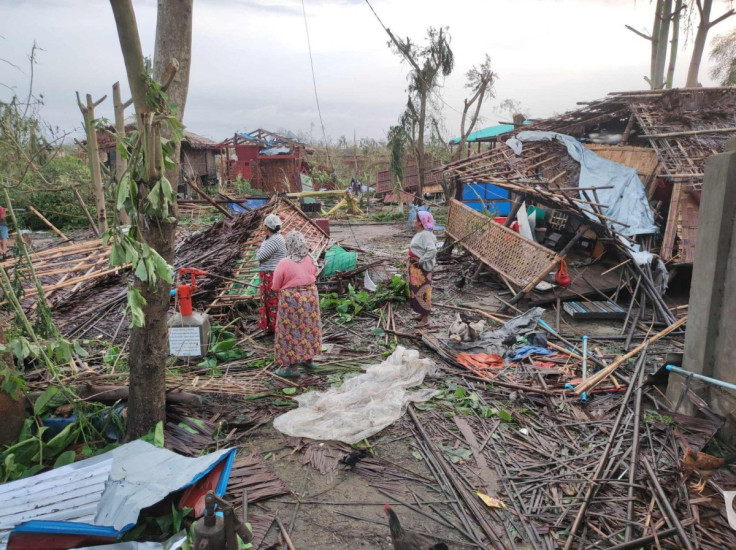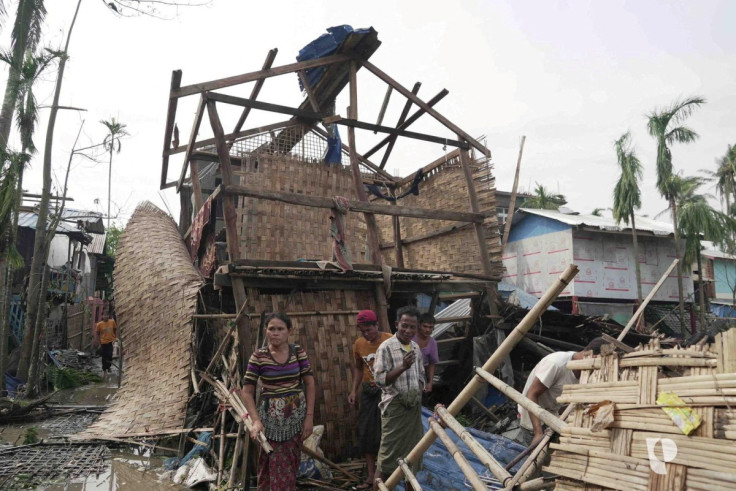Urgent funding is needed for humanitarians to provide life-saving assistance to the victims of Cyclone Mocha
The UN request urgent funding for their life-saving assistance to the victims of Cyclone Mocha, which killed over 450 people, in Myanmar and Bangladesh. The appeal will also help support thousands of Rohingya people, after the storm destroyed refugee camps.

On 14 May, Cyclone Mocha hit the coastline of Bangladesh and Myanmar. The intense force of the cyclone was parallel to that of a category-five storm, crashing through the country at around 130 mph, according to Myanmar's meteorological department.
The Cyclone has killed at least 463 people, said the National Unity Government of Myanmar (NUG).
#CycloneMocha destroyed thousands of homes in #Myanmar, cut off power and left entire communities in ruins without basic services and supplies.
— UN Humanitarian (@UNOCHA) May 21, 2023
🚨 More funding is crucial to address emerging needs and ensure timely delivery of aid to affected people.
➡️ https://t.co/wXJJWmfuXi pic.twitter.com/zJxB4lTRkW
The UN has since appealed for an "urgent injection" of funds. The UN is requesting $333 million to assist 1.6 million of the most vulnerable people in the highest impact zones across Myanmar.
To support those in the areas affected by Cyclone Mocha in Bangladesh, the UN have appealed for $42 million. This call for funding includes $36 million to support the Rohingya refugees living in camps in the area.
The devastation in Myanmar, caused by the direct impact of the cyclone, includes the destruction of houses, power lines being cut off, and camps for displaced Rohingya people being ripped apart in Rakhine State.
A spokesperson from the National Unity Government told reporters: "We received confirmation of about 400 Rohingya deaths, mainly around Sittwe area".
Gwyn Lewis, a UN Resident Coordinator in Bangladesh, told reporters that more than 400,000 people in the country have been impacted by Cyclone Mocha, amongst them are 40,000 Rohingya refugees living in camps who have lost their homes.
Our village was here but the strong cyclone Mocha came and destroyed our village, now it became like desert .
— Saiful Arakani (@Arakani_Saiful) May 16, 2023
More than 400 Rohingya of the IDP camp and in Sittwe Township have died and many of them are missing due to Cyclone Mocha. Still investigating is going on. pic.twitter.com/0r5Dd27Ls6
Gwyn Lewis also stressed that Cyclone Mocha arrived amid a food crisis after a fire in March devastated the refugee camp.
"This means that the Rohingya refugees will receive only 67 per cent of the needed food rations, so one million people will only be getting about two-thirds of the needed food," she said.
In the Thae Chaung Village in Myanmar, Rofat, a local Rohingya, visited the gravesite where his wife and three young children are buried.
"I've lost my land and my children. My wife is dead. I have nothing left to love in this world," Rofat told Radio Free Asia.
Since the cyclone, the United Nations High Commissioner for Refugees (UNHCR) has supported the people affected by the disaster. However, the humanitarian aid organisation requires additional funding if they are to continue with their urgent aid distribution.
Ramanathan Balakrishnan, UN Resident and Humanitarian Coordinator in Myanmar announced: "Thousands of people have already received support and we are hoping to soon receive the green light for a two-week distribution plan... across all affected communities in Rakhine and Chin."
He further added that the 1.6 million identified people who are seeking support included "people who have lost their homes, people who lack access to health services and clean water, people who are food insecure or malnourished, displaced people in camps, stateless people, women, children and people with disabilities".

On Monday, the World Meteorological Organisation (WMO) highlighted the importance of early warning strategies and revealed that Asia hosted the most deaths caused by extreme weather, climate and water-related disasters – Bangladesh made up for over 50 per cent of the death toll in Asia.
Prior to Cyclone Mocha, the Government of Bangladesh evacuated 750,000 people, which inherently saved countless lives. Before the cyclone's arrival, nearby airports were closed, fishermen were ordered to suspend their work, and over 1,000 shelters were set up for the people evacuating vulnerable areas.
"Thanks to early warnings and disaster management, these catastrophic mortality rates are now thankfully history. Early warnings save lives," Petteri Taalas, the Secretary General of WMO, said.
USAid Burma recently revealed that they will provide partners working in the affected regions in Myanmar, with nearly $17 million. The funding will assist with supplying emergency shelters, clean water, sanitation, and relief supplies.
"Those affected are facing a long, miserable monsoon season if we cannot mobilise resources in time," Mr Balakrishnan warned.
© Copyright IBTimes 2025. All rights reserved.






















